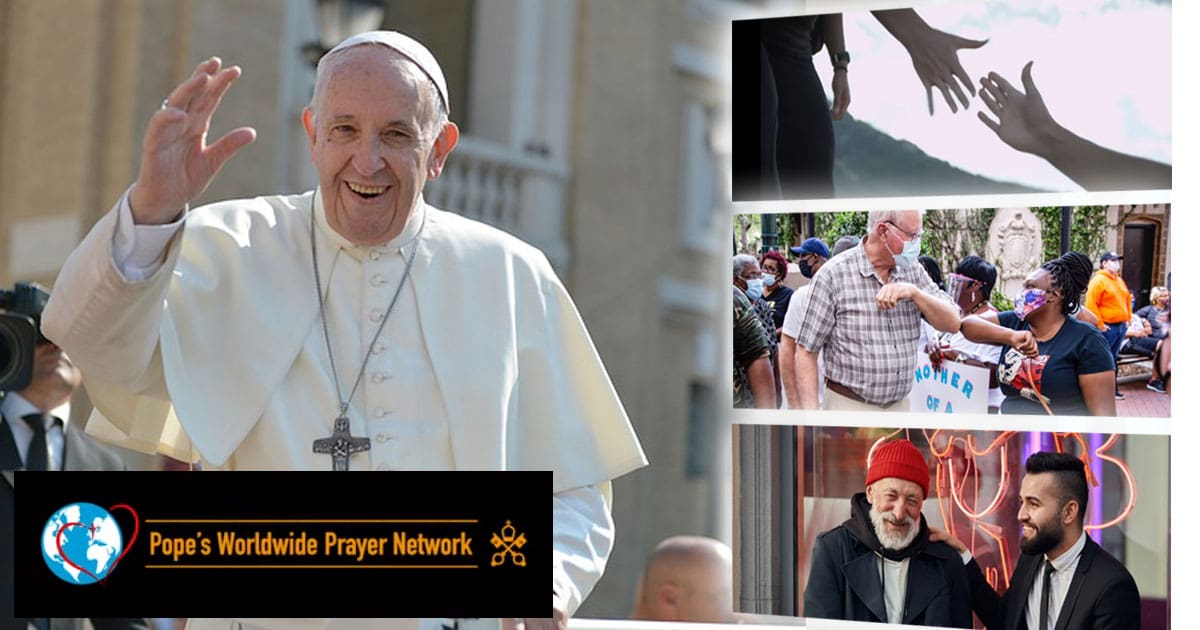What Is Pope Francis Asking His Prayer Group?
History’s Most Famous Christian Prayer Group
Probably the most famous prayer group gathered some 2000 years ago. It seemed to have met regularly in an upper room in Jerusalem.
No film crew recorded their meetings. We do have hints of what happened. They gathered with the first Pope in hope and in fear. They prayed for understanding. Their lives had been upended. They prayed for another appearance of Jesus in their lives. At one of them they were transformed into courageous bearers of “Good News”. They quickly attracted others from all part of the known world.
Fast forward almost 2000 years
In 1861 a still-growing prayer group known as the Apostleship of Prayer already included some 13 million regular members. Over 150 years later Pope Francis, in effect, rebranded the centuries-old Apostleship of Prayer as the “Pope’s Worldwide Prayer Network”. In 2018 he expanded it for a digital world.
“I would also like to invite you to join in the Pope’s Worldwide Prayer Network which spreads, also through social networks, the prayer intentions I propose for the Church each month. In this way, the Apostleship of Prayer moves forward and communion grows”.
Pope Francis’ Prayer Intention – “Pray for an end to polarization”
In a less than two-minute video released July 1, the Pope asks his prayer team to pray for an end to polarization.
Three themes underlie his request:
- The necessity of dialog in a polarized world
- Dialogue as the path to construct the common good
- The call for men and women who are architects of dialogue and friendship
He says
“We must flee from social enmity which only destroys, and leaves ‘polarization’ behind,”
“And this isn’t always easy, especially today when part of our politics, society, and media are bent on creating enemies so as to defeat them in a game of power…”
The pope’s prayer video for July shows scenes of division, such as people rioting in a street, as well as scenes of social friendship, such as a police officer and a black woman embracing.
The video also shows people helping other people, including giving food to the hungry, teaching orphans and immigrants, cleaning up litter, and rescuing migrants from the sea.
In the video, Pope Francis says “dialogue is the path to seeing reality in a new way, so we can live with passion the challenges we face in constructing the common good.”
All this is in line with his most recent encyclical calling for the ‘rebirth of a universal aspiration to fraternity’ (FratelliTutti #8).
“We cannot truly achieve peace without a convinced dialogue between men and women who seek the truth beyond ideologies and differing opinions. Peace must be built up continually; it is a journey made together in constant pursuit of the common good, truthfulness and respect for law,”
His call for “prayer in action”
“Let us pray that, in social, economic, and political situations of conflict, we may be courageous and passionate architects of dialogue and friendship, men and women who always hold out a helping hand, and may no spaces of enmity and war remain.:
“I would like to invite everyone to go beyond their groups of friends and build social friendship, which is so necessary for living together well.”
“And we need to distance ourselves from populisms that exploit the anguish of the people without providing solutions, proposing a mystique that solves nothing”.
He said that our world especially needs to have a renewed encounter with those on the peripheries of society, the most impoverished and vulnerable.
- Can Pope Francis count on your prayers?
- Would you consider inviting others to pray with you?







Thank You, Pope Francis, for the words of wisdom and encouragement, especially at this moment when we seem to be so divided, and our church is also as divided as the rest of the world.
We have two thousand years of consuming and believing in the Eucharist and our Bishops are in the process of working on a document on the Eucharist ?
And if they do come up with a document, I hope and pray that it does not fail to point out in some way that the “Eucharist commits us to the poor” (Catechism of the Catholic Church 1397), to those too, then, in the peripheries, so that they are made to feel that they’re part of the Body of Christ and not cut off or banned from it. This was exemplified by the procession of people who were going to, and coming from, helping a poor family on the outskirts (SV.EN IX:192 @ https://via.library.depaul.edu/cgi/viewcontent.cgi?article=1034&context=vincentian_ebooks). The Eucharist that these people celebrated clearly nourished, not rewarded, them with Jesus’ spirit and strength.